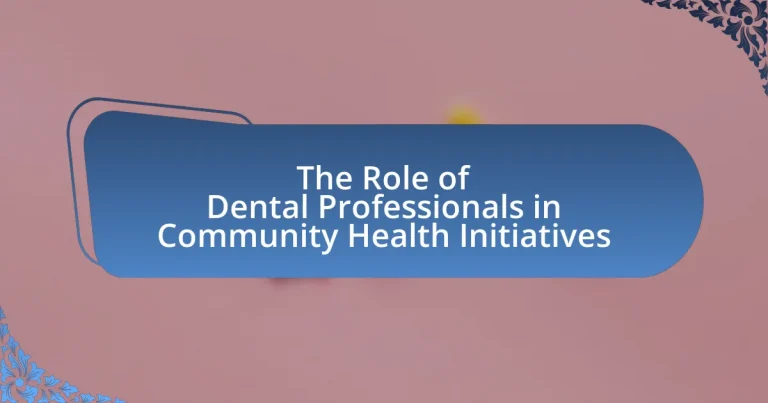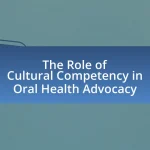Dental professionals play a vital role in community health initiatives by promoting oral health education, providing preventive care, and participating in outreach programs. Their efforts significantly reduce the incidence of dental diseases, particularly in underserved populations, through services such as screenings, fluoride treatments, and educational workshops. Collaboration with public health organizations enhances access to care and addresses health disparities, while advocacy for policy changes supports the integration of oral health into overall health initiatives. This article examines the multifaceted contributions of dental professionals to community health, highlighting their impact on oral health education, preventive services, and the promotion of equitable access to care.
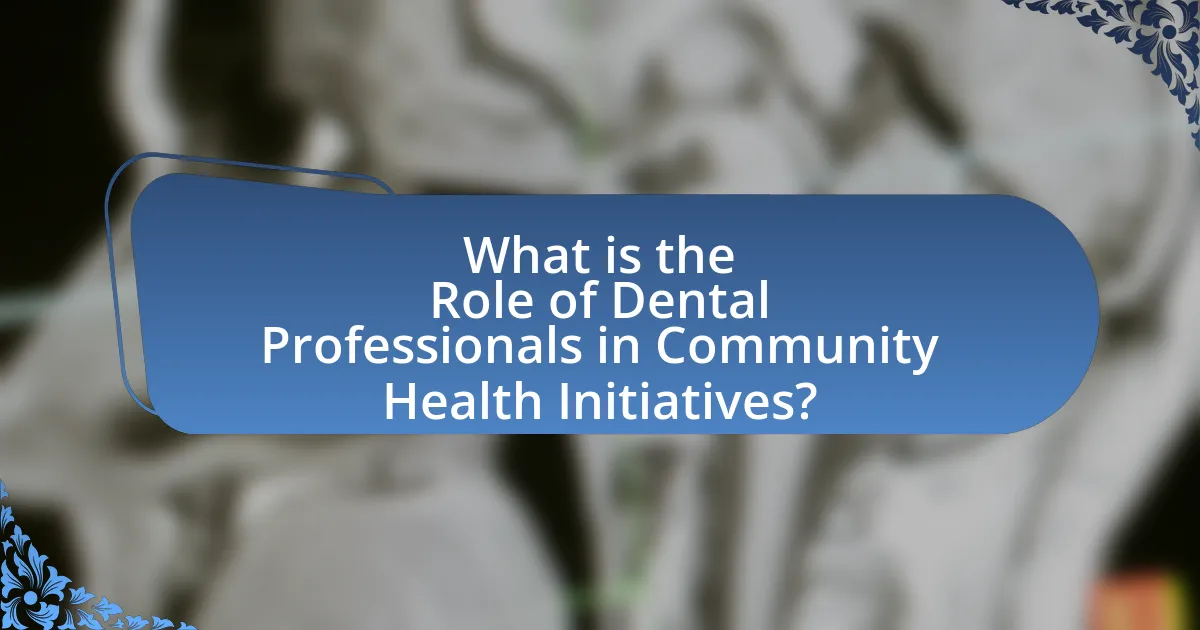
What is the Role of Dental Professionals in Community Health Initiatives?
Dental professionals play a crucial role in community health initiatives by promoting oral health education, providing preventive care, and participating in outreach programs. They educate communities about the importance of oral hygiene, which can significantly reduce the incidence of dental diseases. For instance, studies show that community-based oral health education programs can lead to a 20-30% reduction in dental caries among children. Additionally, dental professionals often collaborate with public health organizations to offer screenings and treatments in underserved areas, addressing disparities in access to dental care. Their involvement in policy advocacy also helps shape public health initiatives that prioritize oral health as a vital component of overall health.
How do dental professionals contribute to community health?
Dental professionals contribute to community health by providing preventive care, education, and access to dental services, which collectively reduce the incidence of oral diseases. They conduct community outreach programs that promote oral hygiene practices, such as regular brushing and flossing, which are essential for preventing cavities and gum disease. According to the Centers for Disease Control and Prevention, community water fluoridation, a practice often advocated by dental professionals, has been shown to reduce tooth decay by 25% in children and adults. Additionally, dental professionals often collaborate with public health organizations to address disparities in access to care, ensuring that underserved populations receive necessary dental services. This multifaceted approach not only improves individual health outcomes but also enhances overall community well-being.
What specific services do dental professionals provide in community health initiatives?
Dental professionals provide a range of specific services in community health initiatives, including preventive care, education, and treatment services. They conduct oral health screenings to identify dental issues early, offer fluoride treatments to prevent cavities, and provide sealants to protect children’s teeth. Additionally, dental professionals educate communities about proper oral hygiene practices and the importance of regular dental visits, which is crucial for maintaining overall health. Research indicates that community-based dental programs can significantly reduce dental disease prevalence, demonstrating the effectiveness of these services in improving public health outcomes.
How do dental professionals collaborate with other health care providers?
Dental professionals collaborate with other health care providers through interdisciplinary communication and coordinated care efforts. This collaboration often involves sharing patient information, discussing treatment plans, and participating in joint health initiatives to address comprehensive health needs. For instance, dental professionals may work with physicians to manage systemic conditions that have oral health implications, such as diabetes or cardiovascular diseases, ensuring that patients receive holistic care. Studies have shown that integrated care models, where dental and medical providers work together, lead to improved health outcomes and increased patient satisfaction, highlighting the effectiveness of such collaborations in community health initiatives.
Why are dental professionals essential in promoting public health?
Dental professionals are essential in promoting public health because they play a critical role in preventing oral diseases, which are linked to systemic health issues. Their expertise in oral health education, early detection of dental problems, and community outreach initiatives significantly reduces the prevalence of conditions such as cavities and periodontal disease. According to the Centers for Disease Control and Prevention, untreated dental diseases can lead to serious health complications, including heart disease and diabetes. By providing preventive care and education, dental professionals contribute to overall health improvement and reduce healthcare costs associated with chronic diseases.
What impact do dental professionals have on oral health education in communities?
Dental professionals significantly enhance oral health education in communities by providing essential knowledge and resources that promote better oral hygiene practices. They conduct educational programs, workshops, and community outreach initiatives that inform individuals about the importance of oral health, preventive care, and the consequences of neglecting dental hygiene. Research indicates that communities with active dental health education programs experience improved oral health outcomes, such as reduced rates of cavities and gum disease. For instance, a study published in the Journal of Public Health Dentistry found that community-based oral health education led to a 30% increase in the use of preventive dental services among participants. This demonstrates that the involvement of dental professionals in educational efforts directly correlates with enhanced community oral health awareness and practices.
How do dental professionals address health disparities in underserved populations?
Dental professionals address health disparities in underserved populations by implementing community outreach programs that provide education, preventive care, and access to dental services. These initiatives often include free or low-cost dental clinics, mobile dental units, and partnerships with local organizations to reach individuals who may lack access to traditional dental care. For example, the American Dental Association reports that community-based programs have successfully increased dental visits among low-income populations by offering services in familiar and accessible settings. Additionally, dental professionals advocate for policy changes that improve access to care, such as expanding Medicaid coverage for dental services, which has been shown to reduce disparities in oral health outcomes.
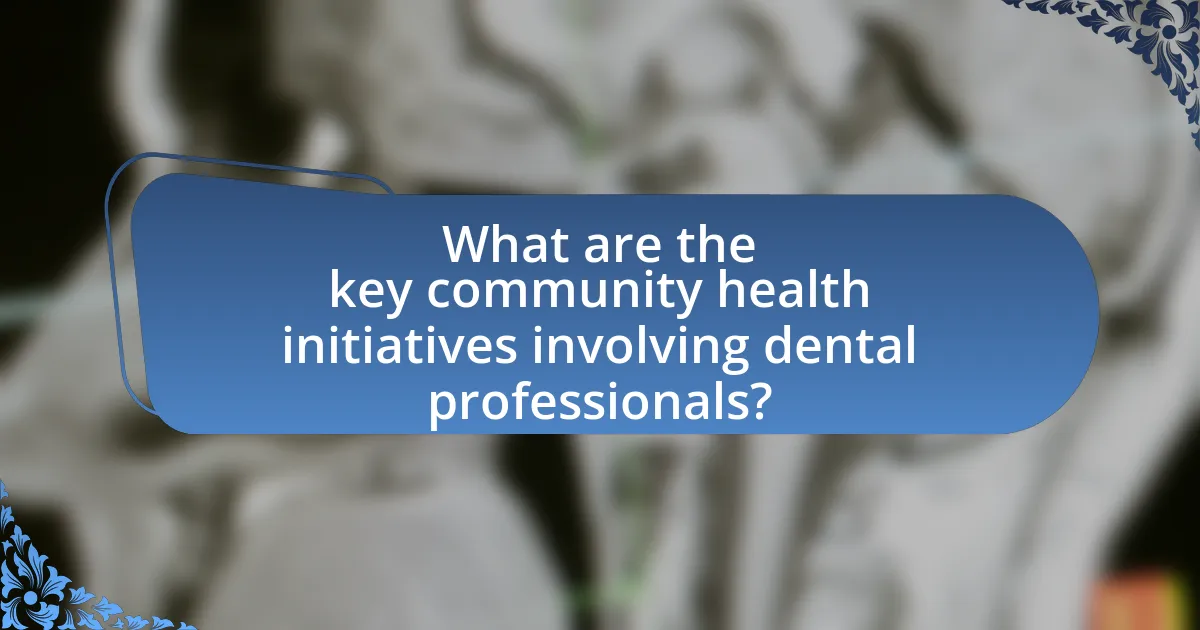
What are the key community health initiatives involving dental professionals?
Key community health initiatives involving dental professionals include preventive care programs, oral health education, and access to dental services for underserved populations. Preventive care programs, such as fluoride varnish applications and sealant placements, aim to reduce the incidence of dental caries among children. Oral health education initiatives focus on teaching communities about proper dental hygiene practices, nutrition, and the importance of regular dental visits. Additionally, dental professionals often participate in outreach programs that provide free or low-cost dental services to low-income families, thereby improving access to necessary care. These initiatives are supported by organizations like the American Dental Association, which emphasizes the role of dental professionals in promoting overall community health.
How do dental professionals participate in preventive care programs?
Dental professionals participate in preventive care programs by conducting oral health screenings, providing education on proper dental hygiene, and offering preventive treatments such as fluoride applications and sealants. These activities are essential in reducing the incidence of dental diseases and promoting overall community health. For instance, the Centers for Disease Control and Prevention (CDC) highlights that community water fluoridation, a preventive measure supported by dental professionals, can reduce tooth decay by 25% in children and adults. Additionally, dental professionals often collaborate with schools and community organizations to implement programs that encourage regular dental visits and healthy lifestyle choices, further enhancing public awareness and access to preventive care.
What types of preventive services are offered by dental professionals in community settings?
Dental professionals in community settings offer a variety of preventive services, including oral health education, dental screenings, fluoride varnish applications, and sealant placements. These services aim to reduce the incidence of dental diseases and promote overall oral health within the community. For instance, oral health education helps individuals understand proper hygiene practices, while fluoride varnish applications can significantly decrease the risk of cavities, as supported by studies showing a reduction in caries rates among children receiving fluoride treatments. Additionally, dental screenings facilitate early detection of oral health issues, allowing for timely intervention.
How do these preventive programs improve community health outcomes?
Preventive programs improve community health outcomes by reducing the incidence of dental diseases and promoting overall oral health. These programs, which often include education on proper oral hygiene, regular screenings, and access to preventive treatments, lead to lower rates of cavities and periodontal disease. For instance, studies have shown that communities with active preventive dental programs experience a 30% reduction in dental caries among children. Additionally, these initiatives foster awareness about the importance of oral health, which is linked to systemic health issues such as diabetes and heart disease, thereby enhancing the overall health of the community.
What role do dental professionals play in health promotion campaigns?
Dental professionals play a crucial role in health promotion campaigns by providing education, preventive care, and community outreach. They educate the public on oral hygiene practices, the importance of regular dental check-ups, and the link between oral health and overall health. For instance, studies show that dental professionals can significantly influence health behaviors, as they often serve as trusted sources of information in their communities. Additionally, they participate in initiatives such as free dental screenings and workshops, which help raise awareness about oral health issues and promote preventive measures. This involvement not only enhances community health but also fosters a culture of preventive care, ultimately reducing the incidence of dental diseases.
How do dental professionals engage with the community during health fairs and outreach events?
Dental professionals engage with the community during health fairs and outreach events by providing free dental screenings, educational workshops, and preventive care services. These activities allow dental professionals to assess oral health, educate the public on proper dental hygiene practices, and promote awareness of oral health issues. For instance, studies show that community outreach programs led by dental professionals can significantly increase knowledge about oral health and improve access to dental care, thereby reducing disparities in dental health among underserved populations.
What strategies do dental professionals use to raise awareness about oral health?
Dental professionals utilize various strategies to raise awareness about oral health, including community outreach programs, educational workshops, and social media campaigns. Community outreach programs often involve free dental check-ups and screenings, which not only provide immediate care but also educate the public on the importance of oral hygiene. Educational workshops in schools and community centers teach children and adults about proper brushing techniques and the impact of diet on oral health. Additionally, social media campaigns leverage platforms like Facebook and Instagram to disseminate information quickly and engage a broader audience, often sharing tips, infographics, and success stories to promote healthy habits. These strategies are supported by studies indicating that community engagement significantly improves public knowledge and attitudes towards oral health, ultimately leading to better health outcomes.
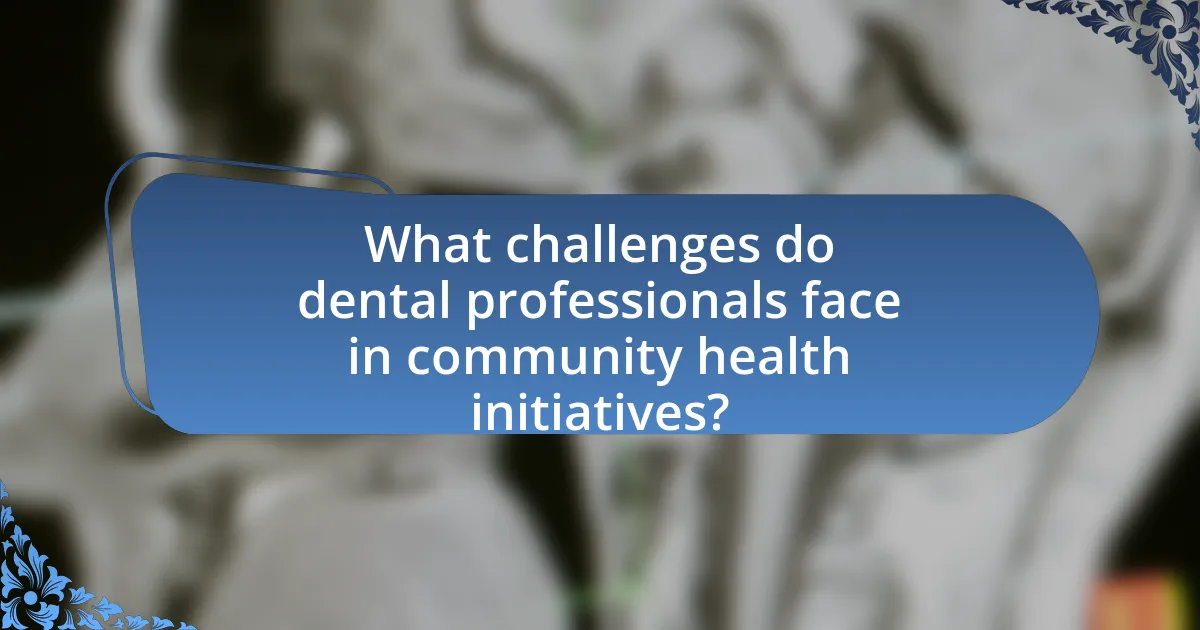
What challenges do dental professionals face in community health initiatives?
Dental professionals face several challenges in community health initiatives, including limited funding, lack of access to resources, and difficulties in engaging the community. Limited funding restricts the ability to implement comprehensive programs, as many initiatives rely on grants or government support that may not be consistently available. Additionally, a lack of access to resources, such as educational materials and dental supplies, hampers the effectiveness of outreach efforts. Engaging the community poses another challenge, as dental professionals often encounter barriers such as cultural differences, misinformation about dental health, and varying levels of health literacy among community members. These factors collectively hinder the successful implementation of community health initiatives aimed at improving oral health outcomes.
How do funding and resource limitations affect dental professionals’ involvement?
Funding and resource limitations significantly reduce dental professionals’ involvement in community health initiatives. When financial support is inadequate, dental practices may lack the necessary tools, staff, and facilities to participate in outreach programs effectively. For instance, a study published in the Journal of Public Health Dentistry found that 60% of dental professionals cited insufficient funding as a barrier to engaging in community service activities. This lack of resources can lead to fewer preventive care programs, limited access to dental education, and reduced overall community health outcomes.
What are the common barriers to accessing dental care in community health initiatives?
Common barriers to accessing dental care in community health initiatives include financial constraints, lack of transportation, limited availability of services, and insufficient awareness of available resources. Financial constraints often prevent individuals from affording dental care, as many community health initiatives may not cover all costs or may require out-of-pocket expenses. Lack of transportation can hinder access, especially in rural areas where dental services are not readily available. Limited availability of services, including a shortage of dental professionals in certain communities, further exacerbates the issue. Additionally, insufficient awareness of available resources and programs can lead to underutilization of dental services, as individuals may not know where to seek help or what services are offered.
How can dental professionals overcome these challenges?
Dental professionals can overcome challenges in community health initiatives by enhancing collaboration with other healthcare providers and engaging in continuous education. Collaborative efforts allow dental professionals to address broader health issues, such as systemic diseases linked to oral health, thereby improving patient outcomes. Continuous education equips dental professionals with the latest knowledge and skills to implement effective community programs. For instance, a study published in the Journal of Dental Research highlighted that interdisciplinary approaches in community health significantly improved access to care and health literacy among underserved populations.
What are the ethical considerations for dental professionals in community health?
Dental professionals in community health must prioritize patient autonomy, informed consent, and equitable access to care. These ethical considerations ensure that individuals are fully aware of their treatment options and can make informed decisions regarding their oral health. Additionally, dental professionals should advocate for vulnerable populations, addressing disparities in access to dental services. Research indicates that ethical practice in community health leads to improved health outcomes and trust between providers and communities. For example, a study published in the Journal of Dental Research highlights the importance of ethical frameworks in guiding community health initiatives, emphasizing the role of dental professionals in promoting social justice and health equity.
How do dental professionals ensure equitable access to care in their initiatives?
Dental professionals ensure equitable access to care in their initiatives by implementing community outreach programs that target underserved populations. These initiatives often include free or low-cost dental clinics, educational workshops, and partnerships with local organizations to raise awareness about available services. For instance, the American Dental Association reports that many dental professionals participate in programs like Give Kids A Smile, which provides dental care to children from low-income families, demonstrating a commitment to reducing barriers to access. Additionally, dental professionals advocate for policy changes that support funding for community health programs, further enhancing access to necessary dental services for marginalized groups.
What responsibilities do dental professionals have towards community members?
Dental professionals have the responsibility to promote oral health and provide accessible dental care to community members. They engage in preventive education, offering information on proper dental hygiene practices and the importance of regular check-ups, which can significantly reduce the incidence of dental diseases. Furthermore, dental professionals often participate in community outreach programs, providing services to underserved populations, thereby addressing disparities in oral health care access. Research indicates that communities with active dental health initiatives experience improved overall health outcomes, highlighting the critical role dental professionals play in fostering healthier communities.
What best practices can dental professionals adopt in community health initiatives?
Dental professionals can adopt several best practices in community health initiatives, including collaboration with local organizations, conducting oral health screenings, and providing educational workshops. Collaboration with local organizations, such as schools and health departments, enhances resource sharing and outreach effectiveness, as evidenced by programs like the American Dental Association’s partnership with community health centers to improve access to care. Conducting oral health screenings allows dental professionals to identify issues early and connect individuals with necessary treatments, which is supported by studies showing that early intervention reduces long-term health costs. Providing educational workshops empowers community members with knowledge about oral hygiene and preventive care, leading to improved health outcomes, as demonstrated by initiatives that have successfully increased awareness and reduced dental disease prevalence in targeted populations.
How can dental professionals effectively measure the impact of their initiatives?
Dental professionals can effectively measure the impact of their initiatives by utilizing quantitative and qualitative metrics, such as patient surveys, clinical outcomes, and community health indicators. For instance, tracking changes in patient oral health status through pre- and post-intervention assessments provides concrete data on the effectiveness of specific programs. Additionally, analyzing community health statistics, such as reductions in dental caries rates or increased access to dental care, can further validate the success of initiatives. Research has shown that initiatives aimed at improving oral health literacy can lead to measurable improvements in patient engagement and health outcomes, reinforcing the importance of these metrics in evaluating impact.
What collaborative approaches can enhance the effectiveness of community health initiatives?
Collaborative approaches that can enhance the effectiveness of community health initiatives include partnerships among healthcare providers, community organizations, and local governments. These collaborations facilitate resource sharing, improve communication, and foster a comprehensive understanding of community needs. For instance, the integration of dental professionals into broader health initiatives has been shown to improve access to care and health outcomes, as evidenced by studies indicating that communities with collaborative health programs experience a 20% increase in preventive care utilization. Additionally, engaging community members in the planning and implementation of health initiatives ensures that programs are culturally relevant and more likely to succeed.
